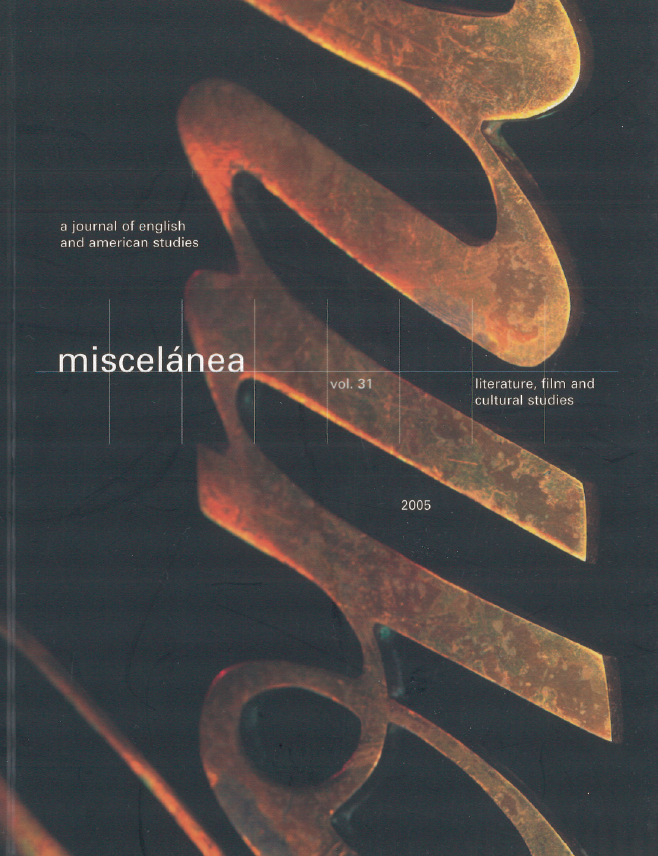La metáfora genérica y el lenguaje político periodístico
DOI:
https://doi.org/10.26754/ojs_misc/mj.200510385Palabras clave:
metáfora genérica, metáfora de evento, metonimia, patrones de interacción, continuidad conceptualResumen
Lakoff y sus colaboradores (Lakoff, 1990 y 1993; Lakoff & Turner, 1989), han propuesto la existencia de al menos las siguientes metáforas genéricas: La Metáfora de la Estructura del Evento, La Gran Cadena del Ser, LO GENÉRICO ES ESPECÍFICO y LOS EVENTOS SON ACCIONES. En este artículo trataremos de demostrar que la mayoría de las metáforas utilizadas para hablar de política corresponden a la Metáfora de la Gran Cadena o a la Metáfora de la Estructura del Acontecimiento. Sin embargo, sólo esta última estructura de manera funcional todo el dominio de la política, mientras que la Metáfora de la Gran Cadena sólo afecta a aspectos parciales del campo. Intentaremos dilucidar por qué es así y cómo afecta al enfoque cognitivo de la metáfora en general. A continuación, trataremos de explicar el posible papel de las demás metáforas genéricas: LO GENÉRICO ES ESPECÍFICO y LOS SUCESOS SON ACCIONES. Además, hemos considerado tres metáforas de nivel genérico: LAS ACCIONES SON SUCESOS, LAS ACCIONES SON ACCIONES y LAS ACCIONES SON ESTADOS. Por último, la conexión conceptual entre las metáforas estructurales y ontológicas es relevante para ciertas cuestiones relacionadas con la Lingüística Cognitiva, en concreto, la interacción conceptual y la continuidad.
Descargas
Citas
CHILTON, Paul. 1996. Security Metaphors: Cold War Discourse from Containment to Common House. Nueva York: Peter Lang.
— 2002. “Do something!: conceptualising responses to the attacks of 11 september 2000”. Journal of Language and Politics, 1 (1): 181-195.
CHILTON, Paul y Christina SCHÄFFNER. 1997. “Discourse and politics”. En van Dijk, Teun Adrianus. (ed.). Discourse as Social Interaction. Dis course Studies. Vol. II. Londres: Sage Publications: 206-230.
CHING, Marvin K. L. 1993. “Games and play: pervasive metaphors in American life”. Metaphor and Symbolic Activity, 8: 43-65.
GRADY, Joseph. 1997. “THEORIES ARE BUILDINGS revisited”. Cognitive Linguistics, 8 (4): 267-290.
HOWE, Nicholas. 1988. “Metaphor in contemporary American political discourse”. Metaphor and Symbolic Activity, 3: 87-104.
KÖVECSES, Zoltán y Günter RADDEN. 1998. “Metonymy: developing a cognitive linguistic view”. Cognitive Linguistics, 9 (1): 37-77.
LAKOFF, George. 1990. “The Invariance Hypothesis: is abstract reason based on imageschemas?” Cognitive Linguistics, 1 (1): 39-74.
— 1991. “Metaphors and war: the metaphor system used to justify war in the Gulf” Lentz Peace Research, 23: 25-29.
— 1993. “The contemporary theory of metaphor”. En Ortony, Andrew. (ed.). Metaphor and Thought, 2ª ed.. Cambridge: Cambridge U. P.: 202-251.
LAKOFF, George y Mark JOHNSON. 1999. Philosophy in the Flesh. The Embodied Mind and its Challenge to Western Thought. Nueva York: Basic Books.
LAKOFF, George y Mark TURNER. 1989. More than Cool Reason. Chicago y Londres: University of Chicago Press.
MORENO, María Ángeles. 2004. La Metáfora Conceptual y el Lenguaje Político Periodístico: Configuración, Interacciones y Niveles de Descripción. [Tesis Doctoral, disponible en red]. Universidad de La Rioja. http://publicaciones.unirioja.es/tesis/tesis28.shtml
PANTHER, Klaus-Uwe y Linda THORNBURG. 1999. “The potential for actuality metonymy in English and Hungarian”. En Panther, Klaus-Uwe y Günter Radden. (eds.). Menonymy in Language and Thought. Ámsterdam y Filadelfia: John Benjamins: 333-359.
RUIZ DE MENDOZA, Francisco José. 1996. “Semantic networks in conceptual structure”. EPOS, 12: 339-356.
— 1998. “On the nature of blending as a cognitive phenomenon”. Journal of Pragmatics, 30 (3): 259-274.
RUIZ DE MENDOZA, Francisco José y Olga Isabel DÍEZ VELASCO. 2002. “Patterns of conceptual interaction”. En Dirven, René y Ralf Pörings. (eds.). Metaphor and Metonymy in Comparison and Contrast. Berlín y Nueva York: Mouton de Gruyter: 489-531.
RUIZ DE MENDOZA, Francisco José y José Luis OTAL. 2002. Metonymy, Grammar and Communication. Granada: Comares.
RUIZ DE MENDOZA, Francisco José y Lorena PÉREZ. 2001. “Metonymy and the grammar: motivation, constraints, and interaction”. Language and Communication, 21: 321-327.
Descargas
Publicado
Cómo citar
Número
Sección
Licencia
Derechos de autor 2005 María Ángeles Moreno Lara

Esta obra está bajo una licencia internacional Creative Commons Atribución-NoComercial 4.0.


